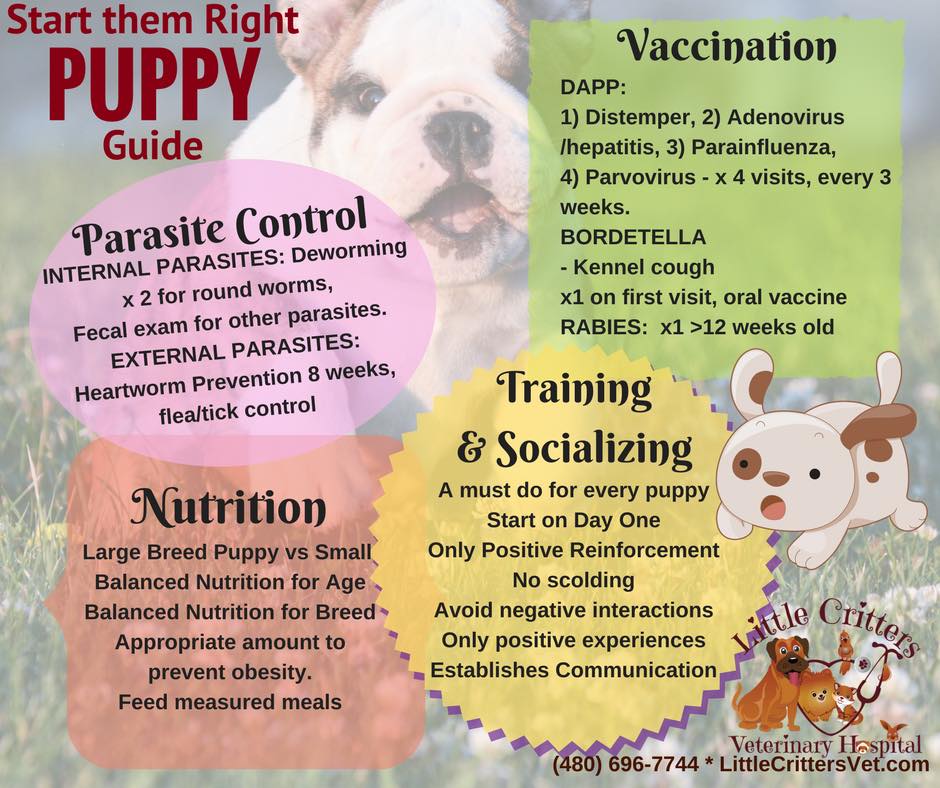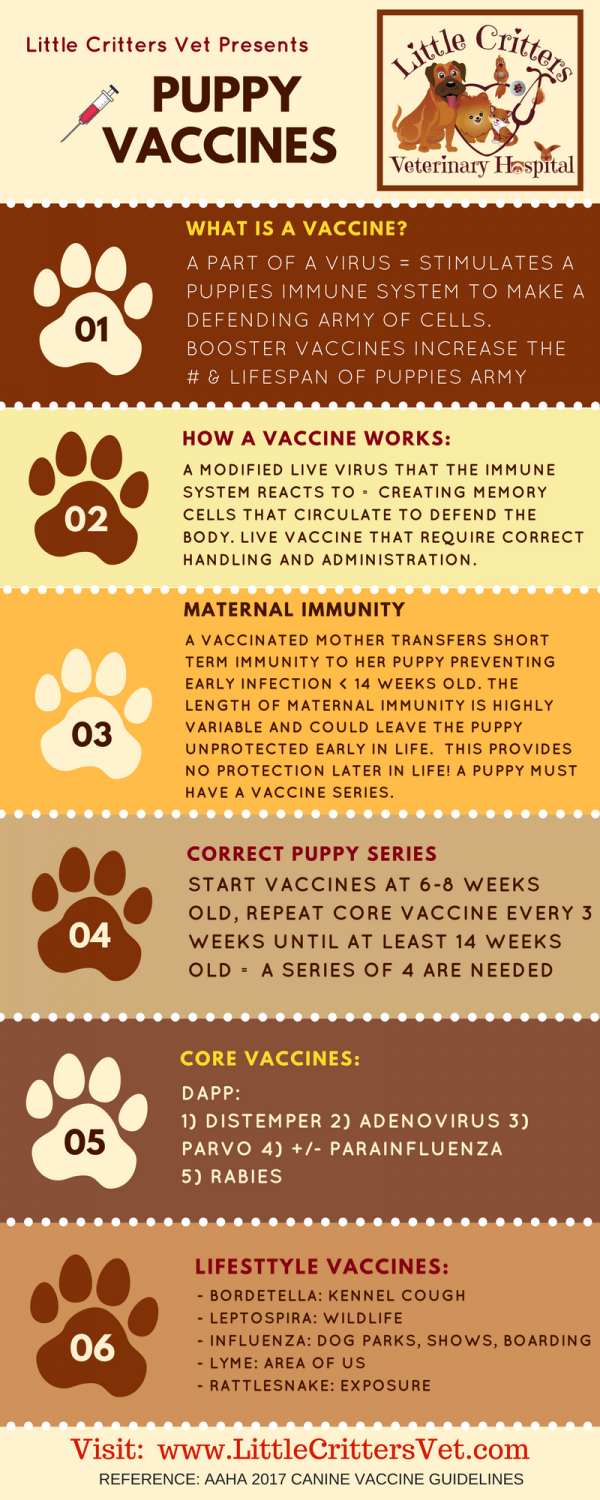|
CANINE VACCINES

Vaccines are often a hotly debated subject in the pet as well as the veterinary community and there are many thoughts on the correct vaccination protocol for our pet adult dogs and cats. In the past it was thought that any disease that a that we had a vaccine for should be given to our pets. As a backlash to this rational many articles in the pet community portrayed vaccines as the enemy and a likely cause of disease. The opinion of the much of the veterinary community and certainly my opinion is a mixture of these two thoughts. The following is a discussion on vaccines in general, how we develop an immune response in a dog, what specific vaccines should be given, and outlines a safe and reasonable vaccination policy for dogs.
Unfortunately, the vaccine debate is often embraced by new puppy owners who don’t understand that the puppies early immunity to these life threatening diseases is entirely due to an appropriate and complete puppy vaccine series. To be very clear the “over-vaccination” theory should not ever be applied to puppies. All puppies must complete their vaccines series to be protected.
What a Vaccine is:
There are many types of vaccines available in human and animal medicine but currently many of our dog vaccines are modified live vaccines. This means that manufacturers have altered the virus so that it will still stimulate immunity but will not be able to cause disease in the patient, thus creating a safer vaccine. Immunity is just the body’s natural defense against infection with antibodies and white blood cells stimulated by the vaccine to become a defending army. When a vaccine is given it mimics the appearance of the natural infection and the body in response literally makes an army of cells to fight this invader.
What a Vaccine isn’t:
Vaccines do not prevent disease in those animals already exposed to the virus. The vaccine must be present prior to exposure to provide time to grow an adequate memory cell army (this takes time and repeated exposure) to aid in defense of the body. So, if you have an unvaccinated puppy that was exposed to parvo virus but not yet ill a vaccine will NOT prevent disease.
How Vaccines work:
Many people who don’t vaccinate their puppies don’t really understand what is vaccine is and how it works so I hope to clarify this. I’m a firm believer that in order to make an informed decision as pet owners we should understand what is being advocated for our pets. Too often owners are just doing what is recommended by the doctor in an attempt to keep our loved ones safe without understanding the “why”. As a veterinarian, I believe that it is important that owners understand why we vaccinate so that they have informed consent and know what they are protecting their pet with and against. By giving a vaccine we are attempting to stimulate the dog’s immune system to create memory cells that will be saved in the body to fight the virus if they encounter it in the future. On the initial exposure to a virus (antigen) the immune system will create a few short lived memory cells but this a small and weak army which will not create long lasting immunity. Therefore, we always provide one booster in 2-3 weeks to give a second boost to the immune system and create millions of long lived memory cells in the body. These cells are constantly circulating in the body looking for foreign invaders to attack and destroy thereby defending the body and providing the pet immunity to the virus.
Why are puppies given a Vaccine series and not just 2 vaccines?
Neonatal puppies, or those recently born, receive all of their initial immunity from their mother through the uterus and the milk. The amount and level of immunity they receive is entirely dependent upon the mother’s vaccination and thus immunity status. Therefore, a mother who has been poorly vaccinated, or never vaccinated, will give poor immunity to her pups and those pups are at a very high risk of contracting very early infections such as parvo virus. To be clear in a well vaccinated mother we should not be seeing parvo virus infection in neonates (under weaning are). So, the mother’s immunity is very important in providing her pups early immunity from disease. However, this is a double edged sword as the mother’s immunity will also block and prevent our vaccine from providing long lived vaccinated immunity to the puppy. Additionally, the mother’s immunity is always short term. Based on her level of memory cells the mother’s immunity may last from a few weeks in the pups to as long as 4 months. But after this all puppies are completely unprotected. This means that your newly purchased 8 week old puppy may or may not have immunity to infection and even if they have early immunity this is always short lived and not lifelong protection. Therefore, all puppies require a vaccine series.
But as we’ve said the mother’s early immunity passes to her pups and blocks our vaccines, so how do we know when her immunity is low enough for our vaccine to work but not so low that the puppy is entirely unprotected? As we’ve learned, puppies early in life are likely to be protected from a vaccinated mother, therefore we do not typically need to vaccinate prior to 6 weeks of age. Thus, we know that the best time to begin vaccines is from 6-8 weeks of age catching those pups that have very limited short term immunity. However, some of these pups may have slightly longer immunity preventing our vaccine from working and preventing the puppy from receiving long lasting immunity to disease. The best way around this is to do sequential vaccines every 3 weeks for a series of 4 vaccines up to age 4 months. By doing this we are ensuring that the pups who have lost early immunity are protected at the proper time and we are also ensuring that the pups with longer lasting immunity are vaccinated long enough for our vaccine to work and a boosters to be given stimulating the puppies natural long term immune response to life threatening diseases.
|
Summery vaccine series in puppies:
- Start vaccines at 6-8 weeks
- Vaccinate every 3 weeks until at least 4 months old
- Dogs in a high risk (high exposure environment) may benefit from one additional vaccines at 18 weeks of age
- Ensures early protection
- Ensures the best lasting immunity into adulthood
I have to stress that even though there is a debate in our community about vaccinating adult animals that debate should NEVER involve immature animals. The ONLY way of ensuring protection from deadly disease in puppies is to vaccinate them properly up to 1 year of age. At that point we have given them long lasting memory cells we may consider extending the subsequent intervals to every 3 years depending on the level of exposure and the vaccine used.
The guidelines I use to establish our safe puppy vaccine protocol are developed from the 2017 American Animal Hospital Canine Vaccine Guidelines. Read more at https://www.aaha.org/guidelines/canine_vaccination_guidelines.aspx
Please Vaccinate Your Puppies.
|
 |
What vaccines are needed?
Needed vaccines are called “core” vaccines and are defined by the AAHA guidelines mentioned above.
Da2pp: Distemper, Adenovirus, Parainfluenza, Parvo Virus (4-way vaccine)
Distemper virus is an often deadly upper respiratory and neurological virus of dogs that the vast majority of dogs do not survive. The disease causes a variety of clinical signs from purulent (pus) nasal discharge, eye discharge, coughing, vomiting, diarrhea and seizures. Infected pets are often febrile (fever >103F) and very depressed/lethargic. The prognosis is very poor go grave. As a side noted infected dogs can infect ferrets.
Adenovirus type 2 is a hepatitis virus of dogs. Canine adenovirus type 2: is also called canine infectious hepatitis and is a very serious disease that often isn’t seen in our area due to vaccination, but once was very common. There is also a type I vaccine that we don’t use because type 2 will protect against both types.
Parvo Virus is often a fatal gastrointestinal infection of all poorly vaccinated dogs both adults and puppies. Puppies are at very high risk to this infection as the virus likes rapidly growing cells which are plentiful in the growing puppy. Sites of infection can include the gastrointestinal tract and the myocardium (heart) in neonates.
Canine Parvo Virus: Is a life threatening disease of puppies & under-vaccinated adults. The virus infects the rapidly growing cells of the intestine which causes severe liquid bloody diarrhea, frequent vomiting and very depressed/lethargic puppies. Puppies that are not treated will usually die from dehydration and septicemia. You can prevent this disease by properly vaccinating your puppy.
Parainfluenza (non-core) is a respiratory infection often involved in kennel cough complex
Parainfluenza: is a dog disease that is part of the kennel cough complex. The virus works with the bordetella bacteria to cause a harsh unproductive cough. These pets typically have a history of exposure to other dogs (often in a kennel situation) and are typically normal except for a cough. They often respond well to treatment and supportive care.
The core combo vaccine is given to puppies every 3 weeks until 4 months of age.
It protects against the worst diseases that frequently are life threatening to puppies.
Rabies: Legally required in all states at various ages. Much be given by a veterinarian.
Additional Vaccines (are many and varied) and depending on where you live in the US and thus your pet’s exposure to disease, they may or may not be indicated. A few commonly used:
Corona Virus: Not currently considered a core vaccine as it is a mild disease the typically infects dogs younger then 6 weeks of age. We do not use this vaccine.
Leptospira: A potentially deadly infection from wildlife urine that is passed from dogs to people. Can cause kidney failure. Recent outbreak in AZ occurred from a boarding facility. Recommend if other dog exposure, dog parts, hiking, camping or wildlife in yard.
Bordetella: Part of the kennel cough complex that we now give as an simple oral drop to all new puppies.
Rattlesnake Vaccine - Crotalus atrox: Given to at risk dogs, does not prevent the need for antivenoum treatment.
VACCINE TITER TESTING AT LITTLE CRITTERS VETERINARY HOSPITAL - For Adult Dogs.
What is it? A simple blood test done in our hospital with same day results will give us an idea of what degree of protective immunity your dog has to fight canine parvo virus, canine distemper virus, and canine adeno virus. If your dog is low on protection for either distemper or parvo we can then give a monovalent (single virus) vaccination only for that disease. This allows us to limit the frequency and number of vaccines for adult dogs. Our adult dog protocol is 3 years with recommended titer testing is your pet has high exposure or disease that may lower the immune response.
BY: LITTLE CRITTERS VETERINARY HOSPITAL
1525 N. Gilbert, RD. Suite C-101, Gilbert, AZ 85234
(480) 696-7744 www.LittleCrittersVet.com
|